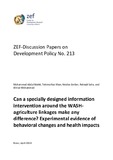Can a specially designed information intervention around the WASH-agriculture linkages make any difference? experimental evidence of behavioral changes and health impacts

View/Open
Date
2016-04Publisher
Zentrum für Entwicklungsforschung (ZEF)Metadata
Show full item recordAbstract
The paper attempts to evaluate the effectiveness of the specially designed packages of water, sanitation and hygiene (WASH) interventions with ‘student brigades’ (student teams tasked with maintaining hygiene in school) on household WASH behaviour and practices in both a household and farm setting. In addition, household members’ health and developmental productivity outcomes were also examined. A randomized control trial (RCT) involving student brigades (SBs) was carried out in six sub-districts (hotspots) characterized by comparatively poor WASH indicators. The specially designed WASH-agriculture treatment consisted of three interventions: (1) informing the households about the prior water testing results; (2) delivering hygiene messages with the help of posters; (3) equipping SB members with water quality test kits and asking them to test the water quality at different places and report their findings to their household. Employing the difference-in-difference (DID) multivariate regression technique, the analysis revealed that the BRAC WASH treatment performed well in terms of effecting behavioural changes and improving hygiene practices. In addition, the results suggested that informing households of their drinking water quality and conveying WASH-agriculture hygiene messages to them could have a significant incremental impact over the existing BRAC WASH treatment in changing household hygiene behaviour and practices at home and on farms. This research provides evidence that students can act as agents of change in improving water quality, sanitation and health in a rural setting.
